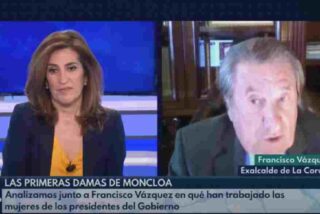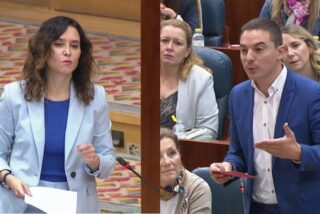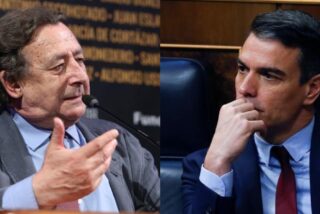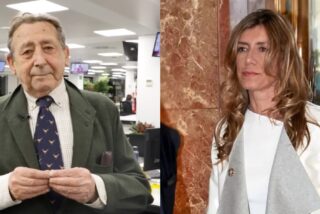Me parece claro que la democracia quizás sea ahora más frágil que en ningún otro momento desde que murió Franco en 1975
Cuando parecía que el ‘calvario‘ mediático de Pedrojota Ramírez terminaba, zanjada por los dueños italianos su destitución del diario ‘El Mundo’ y con su despedida voluntaria de las tertulias radiofónicas en las que participaba, el dicharachero periodista riojano abre un nuevo frente y en esta ocasión contra el todopoderoso ‘The New York Times’.
Y ha arrancado pronto Pedrojota. Todo indica que durmió mal, se despertó temprano este 6 de febrero de 2014 y refocilándose, ante el éxito que supone el que la ‘biblia‘ del periodismo mundial, la muy respetable ‘Dama Gris’ neoyorquina, dedicara amplio espacio a sus cuitas, se lanzó todavía en pantuflas sobre el ordenador para leer la edición digital de ‘The New York Times’.
¡Y menuda sorpresa! Pedrojota confiesa, con amargura, que se quedó de piedra, que no reconocía nada de lo que supuestamente había escrito, que los malandrines neoyorquinos se habián pasado por la entrepierna su magistral pieza, cambiando hasta su sentido.
Y a medio camino entre la rabia sarracena y el desengaño amoroso, abrió su cuenta en la red social Twitter y comenzó a explayarse:
Bdías. 1) Acaba de ocurrirme algo inaudito. The New York Times me pidió un artículo sobre mi destitución. Lo escribí y lo envié…
— Pedro J. Ramirez (@pedroj_ramirez) febrero 6, 2014
2) Recibí la traducción. Con matices me pareció correcta. La aprobé. Pero ellos lo han reescrito por completo, cambiando desde el título…
— Pedro J. Ramirez (@pedroj_ramirez) febrero 6, 2014
— Pedro J. Ramirez (@pedroj_ramirez) febrero 6, 2014
El artículo en cuestión de Ramírez, explicando para el medio estadounidense los entresijos de su destitución de ‘El Mundo’, se titulaba «Otra vez en las fauces del poder», lo que NYT ha metamorfoseado en «In Spain, Fired for Speaking Out» (En España, despedido por hablar claro).
La pieza es larga y como explica el propio rotativo, fue escrita originalmente en español y traducida al inglés por Kristina Cordero. El exdirector de ‘El Mundo’ admite que dio el visto bueno a esa tradución, asi que esta vez no se cabe apelar al socorrido «Traduttore, traditore», proverbio italiano, que literalmente significa «Traductor, traidor».
Lo que alega Pedrojota es que la versión inglesa no respeta el original, que una mano perversa metió pluma en la pieza y que eso cambia el sentido de sus palabras.
Quizá venga al caso, subrayar que ni el consejero delegado de UNEDISA, Antonio Ferández Galiano (Entiendo que busque sus propias explicaciones pero RCS no cede tan sencillamente a las presiones del poder), ni su sucesor en el cargo y supuestamente principal aliado, Casimiro García Abadillo (Ochocientos millones de razones liquidaron a Pedrojota), han avalado públicamente la versión que ha dado Pedrojota sobre los hechos que han conducido a su destitución como director de ‘El Mundo’ tras 25 años en el cargo.
En lo que ha publicado ‘The New York Times’ Pedrojota explica así las cosas:
«Los anteriores presidentes, incluido el socialista José Luis Rodríguez Zapatero, aceptaron las críticas de la prensa. Pero todo cambió cuando Mariano Rajoy llegó al poder. Aunque le apoyamos -desde El Mundo- en tres ocasiones, una vez en el poder mostró hostilidad hacia las verdades incómodas e indiferencia respecto a la opinión pública».
«Mi confrontación con el Gobierno empezó el año pasado, cuando el extesorero del partido de Mariano Rajoy, Luis Bárcenas, ahora encarcelado con cargos de corrupción y fraude fiscal, aportó documentos que mostraban la financiación ilegal del partido durante casi dos décadas».
Y concluye:
«España ha estado en serios problemas desde que la burbuja inmobiliaria estalló en 2008. El desempleo ha estado rondando en torno al 25 por ciento, y la economía apenas ha salido de la recesión. El Partido en el Gobierno del Señor Rajoy carece de democracia interna. La independencia del poder judicial se ha debilitado. La monarquía se ha visto empañada por un escándalo de gastos. Si le añadimos el ataque a la prensa, me parece claro que la democracia quizás sea ahora más frágil que en ningún otro momento desde que murió Franco en 1975. Yo tengo pensado seguir escribiendo sobre ello».
Cuesta creer que Pedrojota escribiera «the separatist group» para referirse a ETA, pero es él quien dabe probar que no fue así. El ex ministro socialista José Luis Corcuera (Pedrojota Ramírez daba páginas a ETA) suele decir que es capaz de eso y de mucho más.
John Müller, que lo conoce bien y es periodista sabio, prudente y decidido, escribe en Twitter:
No creo que @pedroj_ramirez escribiera «…Democracy might be more fragile now than at any point since Franco died» estando 23-F y 11-M ahí.
— John Müller (@cultrun) febrero 6, 2014
En cualquier caso y a la espera de que Ramírez nos facilite los párrafos concretos que según él han sido alterados y su artículo original, les dejamos aquí lo que ha publicado ‘The New York Times’:
In Spain, Fired for Speaking Out
By PEDRO J. RAMÍREZFEB. 5, 2014
MADRID — FOUR decades ago, I interviewed the New York Times columnist Tom Wicker about the relationship between the government and the press. It was the Watergate era, and journalism appealed to me as a noble calling.
Mr. Wicker told me that conflict was all but inevitable between executive branches and newspapers that did their duty. He observed that where democracy was weak, newspapers that criticized the government would pay dearly for their audacity. “Careful with the Leviathan,” he said. He quoted John Adams: “The jaws of power are always open to devour, and her arm is always stretched out, if possible, to destroy the freedom of thinking, speaking and writing.”
The truth of that statement was confirmed for me last week, when I was fired as the editor of El Mundo, Spain’s second-largest newspaper, which I co-founded in 1989. The paper’s owner, Unidad Editorial, which is part of an Italian conglomerate, praised my tenure but denied buckling to political pressure. Sunday’s issue was my last.
My confrontation with the government began last year, when an ally of Prime Minister Mariano Rajoy — his political party’s former treasurer, Luis Bárcenas, now jailed on charges of corruption and tax fraud — furnished documents showing illegal financing of the party over nearly two decades. We published an exposé, and turned over the documents to a judge investigating the case. We also published text messages of support that Mr. Rajoy had sent to Mr. Bárcenas.
Mr. Rajoy was livid. “El Mundo distorts and manipulates to produce slander,” he told the Senate on Aug. 1. Shortly after this, the party’s secretary general, María Dolores de Cospedal, said, “I don’t read El Mundo,” which was interpreted as a government-sanctioned boycott of the newspaper.
High-level officials, unlike in the past, stayed away from an international journalism awards ceremony we had established in the memory of three reporters who had died in the line of duty.
Some of Spain’s biggest companies, many of which are in sectors that are heavily regulated by the government, canceled their advertising. Barry Sussman, an editor who helped lead The Washington Post’s coverage of Watergate, wrote in our pages that we were dealing with the same situation: a combination of dirty money and efforts to intimidate the press.
This heavy-handed government, which has been mum about my dismissal, reminds me of 1974, when I interviewed Mr. Wicker. Gen. Francisco Franco was still in power, but Spain’s collective desire for freedom and democracy had taken on a life of its own.
He died the next year, and the press was pivotal in the transition from dictatorship to democracy. Newspapers linked to the old regime had no credibility. Opportunities suddenly opened for journalists of my generation. In 1980, at age 28, I was named editor of the newspaper Diario 16. It was a crash course in journalism and democracy.
In just a few years we endured seemingly all of the nerve-racking situations that a new democracy could possibly experience. We categorically opposed attempts by Franco’s former generals to undermine the new government.
We opposed the terrorism of Basque separatists — but also the death squads that Prime Minister Felipe González’s Socialist government assembled to fight the separatist group, known as ETA.
In 1988, after our investigative reporting linked the Spanish government to the death squads’ killings in the south of France, Mr. González intercepted me in a corridor at the Parliament and asked me to stop publishing “those terrible things.” I refused, and a few months later I was fired. The owner of the newspaper had succumbed to political pressure.
Dozens of journalists quit and joined me to found El Mundo, “a new newspaper for a new generation of readers.”
It was a rapid success. We quickly occupied a center-right political space, with a strong base of readers among young urban professionals. We resumed our investigation into the death squads.
In the late 1990s, as a result of our exposés, Mr. González’s interior minister and his director of state security were convicted of kidnapping. A general in the Spanish military police was found guilty of murder.
Previous prime ministers, including José Luis Rodríguez Zapatero, Mr. Rajoy’s Socialist predecessor, accepted press criticism. But everything changed when Mr. Rajoy, the leader of the conservative People’s Party, came to power. Though we had endorsed him on three occasions, once in power he exhibited hostility toward uncomfortable truths and indifference to public opinion.
As elsewhere, journalism in Spain has been under economic pressure. Newspaper advertising fell by two-thirds in six years, and print circulation by more than one-third. El Mundo is a leading newspaper online in Spain, with 7.2 million monthly unique users of its main website and 127,000 digital subscribers, but online revenues are not enough to balance the books. So the political pressure from the government, and its effect on advertising, came at a vulnerable moment.
Spain has been in serious trouble since the property bubble burst in 2008. Unemployment has been hovering around 25 percent, and the economy is barely out of recession. Mr. Rajoy’s governing party lacks internal democracy. The independence of the judiciary has been weakened.
The monarchy has been tarnished by a spending scandal. Add in the attack on the press, and it seems clear to me that democracy might be more fragile now than at any point since Franco died in 1975. I plan to keep writing about it.
Pedro J. Ramírez was the editor of El Mundo from its founding in 1989 until Saturday. This essay was translated by Kristina Cordero from the Spanish.













































